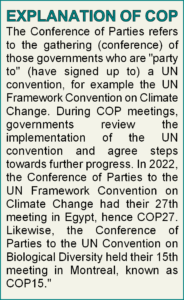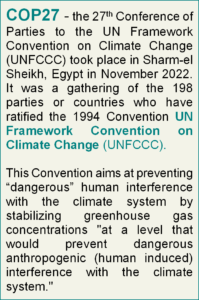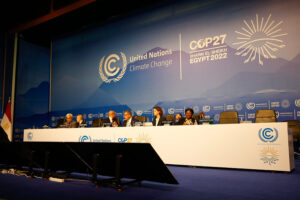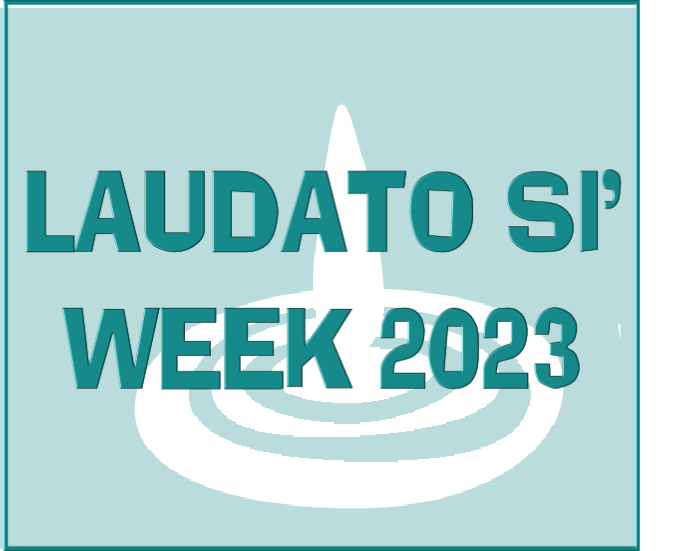To mark the eighth anniversary of the publication of the encyclical “Laudato Si’ – On Care for Our Common Home” this week (on 24 May), we look briefly at the current state of the world’s efforts to deal with the Climate Change and Biodiversity crises facing our world. In particular, we look back at the two Conference of Parties Meetings that took place in 2022 – COP27 on Climate Change and COP15 on Biodiversity and ask what happened and what needs to happen in order to make real progress in protecting our Common Home.
 This article focusing on the Convention on Climate Change, is the first of two articles that will be published this week, the next will look at the Biodiversity Convention.
This article focusing on the Convention on Climate Change, is the first of two articles that will be published this week, the next will look at the Biodiversity Convention.
Background: Many observers, climate activists and even governments’ experience the meetings of the Conference of Parties (COP) has been one of frustration and delays. Unfortunately, time and again these meetings see powerful nations jealously protect their interests at the expense of poorer countries and the wellbeing of the planet. It had seemed that the Paris Agreement signed at COP21 in 2015 was a breakthrough moment of common purpose to reduce carbon emissions. However, since then, it has been business as usual: necessary actions have been kicked down the road or not implemented at all. (e.g. the Climate Adaptation Fund)
 COP27–What Happened: Given the global situation in 2022, marked by extreme and damaging weather events and the outbreak of war in Ukraine, it was hoped, after many years of procrastination, that COP27 would at last make effective decisions to deal with climate change. This did not happen; instead negotiations were gridlocked, the meeting was extended for two days and there were last minute changes and objections that watered down the final agreed text to emerge from the meeting.
COP27–What Happened: Given the global situation in 2022, marked by extreme and damaging weather events and the outbreak of war in Ukraine, it was hoped, after many years of procrastination, that COP27 would at last make effective decisions to deal with climate change. This did not happen; instead negotiations were gridlocked, the meeting was extended for two days and there were last minute changes and objections that watered down the final agreed text to emerge from the meeting.
COP27 failed in a number of ways:
- It missed the opportunity to establish more ambitious carbon emission reduction targets, making staying within the 1.5 °C threshold all but impossible.
- Attempts to agree a “phasing down” of oil production were scuppered by objections from Saudi Arabia, Russia, Nigeria and developing countries who wished to benefit from their as yet untapped resources. As a result, there is no commitment to phasing out or even phasing down fossil fuels.
- Finally, a surprise reference to “low-emission technologies” in relation to natural gas caused fears that this could be used as a loophole to justify further gas extraction by portraying it as a “greener” fuel than coal.
 A Positive Note: At COP27, governments did successfully reach an agreement on a Loss and Damage Fund – undoubtedly the most positive result of COP27. This new fund will, when operational, provide vulnerable countries with compensation for the destructive impacts of climate change. It will compensate poor countries that suffer from extreme weather events such as droughts, floods and heat waves that have been made worse by the carbon emissions of rich countries. This is, without doubt, a positive result – but the Fund does not exist yet. Who will contribute, how much and when has not been decided. Decisions regarding how, and under what criteria, funds will be disbursed have yet to be made. Hopefully these issues will be addressed at this year’s COP28 in Dubai, but this is by no means assured! The developed world still has not kept its 2009 pledge to establish a Fund that would provide 100 billion euros a year to help poor nations to develop green energy and adapt to warming.
A Positive Note: At COP27, governments did successfully reach an agreement on a Loss and Damage Fund – undoubtedly the most positive result of COP27. This new fund will, when operational, provide vulnerable countries with compensation for the destructive impacts of climate change. It will compensate poor countries that suffer from extreme weather events such as droughts, floods and heat waves that have been made worse by the carbon emissions of rich countries. This is, without doubt, a positive result – but the Fund does not exist yet. Who will contribute, how much and when has not been decided. Decisions regarding how, and under what criteria, funds will be disbursed have yet to be made. Hopefully these issues will be addressed at this year’s COP28 in Dubai, but this is by no means assured! The developed world still has not kept its 2009 pledge to establish a Fund that would provide 100 billion euros a year to help poor nations to develop green energy and adapt to warming.
Outcomes of COP27: Speaking after the meeting, Ursula von der Leyen, the President of the European Commission, said that the final agreement had “not delivered on a commitment by the world’s major emitters to phase down fossil fuels, nor new commitments on climate mitigation.” Likewise, her colleague, Frans Timmermans said that the final deal “allows countries to hide from their responsibilities.”
Overall, COP27 was, in spite of the agreement to establish a Loss and Damage Fund, a disappointment. The decisive changes that many hoped for did not emerge.
What next? To keep the goals of the Paris Agreement within reach, the leaders at COP28 will need to:
- Increase their ambition and submit improved emissions pledges in order keep within the limit of 1.5˚C degrees global warming. If this proves impossible, then we must at the very least stick as closely as possible to that target!
- Focus on phasing out fossil fuels and the rapid ramping up of renewables.
- Make progress and deliver on a number of existing climate finance commitments, i.e. working out the concrete details of the Loss and Damage Fund and meeting other existing finance commitments including the $100 billion in financing to developing economies pledged to start in 2020.
The second article in this series will be published shortly.

